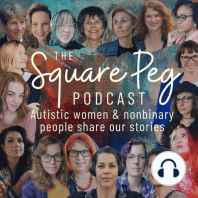51 min listen

66. S5, Ep11: A life-saving autism diagnosis: BPD, eating disorders and an autistic experience of the mental health system
66. S5, Ep11: A life-saving autism diagnosis: BPD, eating disorders and an autistic experience of the mental health system
ratings:
Length:
59 minutes
Released:
Mar 19, 2022
Format:
Podcast episode
Description
Chloe Slater was diagnosed autistic aged 25, and has been in the mental health system since the age of 16, where she says she has experienced ‘awful treatment, amazing care, and everything in between’. Content warning: Chloe and I cover some challenging topics in this episode, including eating disorders, self harm, medical trauma, suicidal ideation and suicide. So if you would rather not hear about these topics, you might not want to listen to this one. Now 34, Chloe lives in Stroud, Gloucestershire, in the UK, with her two dogs and other pets. After studying art in college she found herself unable to complete further studies. Diagnosed first with Borderline Personality Disorder, she describes herself as ‘mostly a happy loner’ who enjoys being surrounded by animals and a select few humans. In our conversation we talk about: ➡ Her joy in her special interests ➡ The impact of her BPD diagnosis ➡ Introversion and social difficulties ➡ How interoception and alexithymia can interplay with eating disorders ➡ The intersectionality of mental health and autism ➡ And fitting in to the autistic community I feel privileged to share our conversation with you. Choe’s story is a testament both to her own resilience and to the value of diagnosis; as she says, discovering she was autistic and receiving a diagnosis literally saved her life. Squarepeg is a podcast in which neurodivergent women, and trans and nonbinary people, explore navigating a neurotypical world and share their insights, challenges and successes. I hope that these conversations will be inspiring and thought provoking, open you up to new ways of thinking about being neurodivergent, and help you feel more connected to a worldwide community of people with similar experiences. I’m Amy Richards, and after being diagnosed autistic at the age of 37 I’m now on a mission to learn more about different perspectives and issues around being a neurodivergent adult in a world that feels like it doesn’t quite fit. EPISODE LINKS: Chloe's Instagram: https://www.instagram.com/slater.chloe/ Her Twitter: https://twitter.com/outfitappro If you'd like to connect or get in touch with Squarepeg, you can find me on: Instagram: https://www.instagram.com/squarepeg.community/ Twitter: https://twitter.com/squarepegautism Facebook: https://www.facebook.com/squarepegautism/ Or on my website: https://squarepeg.community/ THANK YOU TO MY PATRONS! A HUGE thank you to my amazing patrons, who support my work on the podcast: Abi Hunter, Amy Adler, Amy-Beth Mellor, Abigail J Moore, Ben Davies, Benita Borchard-Thierbach, Caroline, Cat Preston, Catrin Green, Cindy Bailey, Corinne Cariad, Danielle Warby, Dawn Trevellion, Elizabeth Williams, Elise, Jackie Allen, Jeff Goldman, Kate Faust, Katharine Richards, Katherine Lynch, Lea Li, Lilli Simmons, Mandy Allen, Pete Burke, Rebecca Kemp, Sarah Jeffery, Sarah Swanton, Sioned Wynn, Susan Millington, Suzanna Chen, Suzanne, Tree Hall, Una Walkenhorst, Vera Cady, Vicki Temple and Victoria Routledge. If you’re enjoying the Squarepeg podcast and would like to help me carry on making new episodes, you can become a member of the Squarepeg community on Patreon from just £3 per month: https://www.patreon.com/squarepegpodcast
Released:
Mar 19, 2022
Format:
Podcast episode
Titles in the series (100)
23. S2, Ep11: Autistic adults and children in therapy: attitudes and approaches: Deborah Cullinan was diagnosed autistic about 10 years ago. She is a psychotherapist in her early 60s, working in a busy CAMHS clinic (that’s Child and Adolescent Mental Health Services) in Hertfordshire in the UK. She started her career as an... by The Squarepeg Podcast